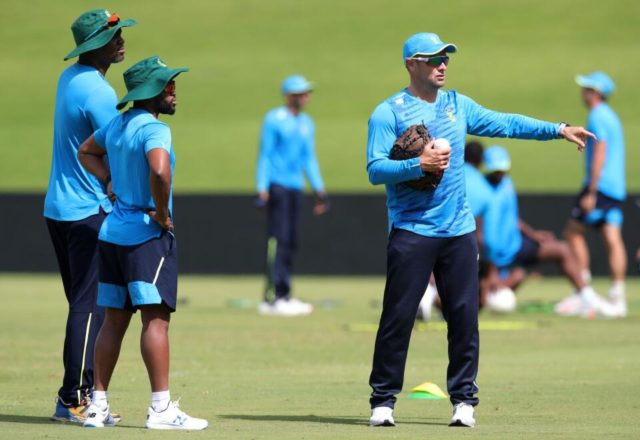Given the age we live in, where a helicopter, controlled in Houston, is about to fly around Mars, passing notes does seem archaic.
AT TIMES it looked like a couple of naughty school kids passing crib notes to each other and not a professional cricket team trying to win a series.
Temba Bavuma had a note in his pocket while on the field. Up in the changeroom Mark Boucher had another longer note; Boucher, Bavuma and the injured Rassie van der Dussen then looked to be comparing notes, and at another point Tabraiz Shamsi was passed a note by Bavuma, which Shamsi showed to Lizaad Williams in the dugout.
Given the age we live in, where a helicopter, controlled in Houston, is about to fly around Mars, passing notes does seem archaic.
There was nothing sinister about it, no classified secrets, just targets for the players according to Boucher. “When you’re chasing a big total you want to break it down to take the pressure off the batters in the middle so that they don’t panic. The same for the bowlers, we found that we are not playing small pockets of the game well, so if we set the bowlers targets and keep the damage limited, then it helps them to focus on the smaller areas of the game.
“It’s just a guideline for where we want to be in a small period of time.”
Bits of paper with guidelines does suggest a team that needs all the help it can get. The starting XI in Wednesday’s series decider against Pakistan had just 154 ODI caps among them and more than a third of those belonged to Andile Phehlukwayo.
South African supporters may grow tired of hearing that the team is in transition, but there has to be an acceptance of the reality that that is in fact the case. Boucher has had to quickly adapt to his team’s requirements; in just nine ODIs since he took over as head coach, South Africa have won five times and lost three matches, a period in which there’ve been two captains as well.
Bavuma’s first series had its good moments – there was the fightback with the ball led by Anrich Nortjé in the first match, which the big fast bowler continued in the second when South Africa won, while in the third Bavuma made a clever adjustment with the use of his spinners that brought South Africa back into that match.
Unfortunately, as Boucher mentioned afterwards, the captain probably gave the spinners a couple overs too many and Pakistan cashed in to the tune of 56 runs in the last three overs of their innings, which ultimately decided the outcome.
“In the first ODI we played at about 50% and still had a chance to win the game,” said Boucher. “Had we been a lot better in the field, we’d have won that game. It’s little things we need to shape up on. We need to play at a higher intensity, be a bit more desperate in the field especially. Usually we’re very good, but we’re not that good at the moment.”
The fielding is a concern; South Africa dropped crucial catches, there were too many misses on the ground, and a hesitancy that gives the opposing batsmen too many opportunities.
Form with the bat and ball can fluctuate, but fielding is an area that all the players can control consistently and the Proteas have failed to do so all season. No amount of note passing is going to solve that issue, only a change in mentality.
With the ball, as pointed out earlier this week by bowling coach Charl Langeveldt, South Africa started well, but the change bowlers in the middle period gave Pakistan too many easy opportunities to accelerate their scoring.
It took Nortjé’s high pace to unsettle the Pakistanis, but as could be seen when he, Kagiso Rabada and Lungi Ngidi were absent, South Africa’s seamers were unable to throw any impactful punches. Tabraiz Shamsi had a bad series, allowing Keshav Maharaj the opportunity to grab the spotlight in the last match.
Van der Dussen was the star with the bat and his absence in the third ODI left a big hole, while Phehlukwayo’s half century offered encouraging signs of his ability, but his consistency needs to improve drastically.
That can be said of South Africa as a whole, but it is difficult to achieve when there are so many changes – whether in the position of captaincy or in terms of personnel as was the case for the third ODI.
South Africa’s next officially scheduled tour is to Ireland in July, and perhaps it’s worth getting accustomed to notes getting passed around, while the Proteas continue to find themselves as a team.








